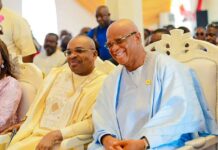By Chukwuemka Njoku, Abuja
The Code of Conduct Tribunal sitting in Abuja on Tuesday gave a dissenting ruling on the propriety or otherwise of adjourning sine due, the planned arraignment of the embattled Chief Justice of Nigeria, CJN,Justice Walter Onnoghen.
Justice Onnoghen, for the second time, had refused to appear before the Hon. Umar Danladi led Code of Conduct Tribunal sitting in Abuja.
The scheduled arraignment of Justice Onnoghen at the Code of Conduct Tribunal on January 14, was stalled following the absence of the defendant in court.
Delivering ruling on the application made by Wole Olanipekun SAN, lead counsel for the CJN, for an indefinite suspension of the trial, Chairman of CCT, Umar Danladi refused to adjourn the matter sine die
The CCT chairman in his ruling held that the orders made by the Federal High Court and the National Industrial Court restraining the Federal Government from arraigning Onnoghen, are not binding on the CCT, because they are orders made by courts of coordinate jurisdictions.
Danladi insisted that any order made by the Federal High Court or the Industrial Court cannot stop the CCT from discharging it’s constitutional duties of adjudicating on matters relating to assets declaration.
Danladi said any other Court asking the CCT to stop discharging it’s duties is a crystal violation of the provisions of the constitution that created the CCT.
The CCT Chairman ,therefore ,held that the Court orders were null and void, insisting that by the provisions of section 46 of the 1999 Constitution, the FHC, NIC and CCT are court’s of coordinate jurisdictions.
“Hence, the CCT is not bound to obey the orders made by the Federal High Court and the National Industrial Court.
More so, the CCT Chairman noted that parties that obtained the various orders were not in the instant case, insisting they lack the locus standi to ask for an interim restraining order against the Federal Government.
“I hereby discountenance the said restraining orders, and they have no binding effect on the CCT” Danladi held.
Based on section 306 of the Administration of Criminal Justice Act 2015, the CCT chairman stated that stay of proceedings cannot be entertained in a criminal case.
Consequently, he ordered the defendant to move his motion challenging jurisdiction and the competence of the charge.
In his own ruling, a member of the tribunal, Hon. Williams Atadze ordered that the matter be adjourned sine die pending the determination of the suits.
Atadze agreed with Wole Olanipekun that going by section 287 of the 1999 constitution, an order of a court is subsisting until set aside by due process of the law.
He insisted that the CCT cannot operate in isolation, insisting that the court orders are subsisting until set aside.
Atadze contended that the orders and decisions of the courts are all binding on the CCT in order to avoid judicial anarchy.
He restated that the issue of jurisdiction is in contention and that you cannot build something on nothing.
Atadze, in his dissenting ruling insisted that steps should be taken to resolve the issue of whether or not the CCT has jurisdiction to hear the matter.
He said the appeal filed by the CJN against the order of the CCT on January 14, should go on as slated on January 24.
However, the 3rd member of the 3-man panel, Mrs Julie Anabo said she agreed with the position of the CCT chairman and adopted his ruling in its entirety.
Moves made by the prosecution counsel for the tribunal to hear his application requesting that Onnoghen should resign his office and headship of NJC, was opposes by Olanipekun.
Consequently, the matter has been adjourned to Monday January 28, for hearing of the CJN’s application challenging jurisdiction and competence of the charge.
Justice Onnoghen is being accused by the Federal Government of failing to declare his assets as required by law and for operating bank domiciliary foreign currency accounts.
Between January 14 and January 22, three court’s of competent jurisdictions have given three separate orders restraining the Federal Government from going ahead to arraign Onnoghen.
Also, the National Industrial Court made 2 similar orders stopping the planned arraignment of the CJN and his forceful removal by President Muhammadu Buhari.
At commencement of Tuesday’s sitting, the prosecution counsel, Aliyu Umar SAN, said the business of the day was for arraignment and hearing of all pending applications.
But he said the arraignment would not take place because the defendant was not in court.
Umar told the court to demand from the defence counsel whether service was effected in order to know why the CJN was absent.
Responding, Wole Olanipekun rather said the matter was adjourned for hearing of motions according to the record of the court and not arraignment.
Olanipekun informed the tribunal of all the four orders made by various courts of competent jurisdictions restraining the Federal Government from arraigning the CJN.
He equally told the CCT panel that the Court of Appeal is ceased of the matter and had fixed January 24 to hear Onnoghen’s appeal against the order made by the CCT on January 14, to the effect that the prosecution’s motion would be heard together with the defence counsel application challenging jurisdiction and competence of the charge.
Therefore, he urged the court to adjourn indefinitely to enable the various courts hear and determine the issues raised in respect of the planned arraignment of the CJN.
Olanipekun informed the tribunal that a Federal High Court Abuja made an order on January 14, in suit number FHC/ABJ/CS/29/2019, restraining the defendants from taking any further action pending the hearing and determination of the motion on notice seeking to halt the arraignment.
He told the court that the CCB and the Chairman of CCT are 2nd and 3rd defendants in suit, just as he informed tribunal that the life span of the ex parte order had been extended to January 28, adding that motion on notice was equally fixed same day.
Olanipekun also mentioned the order made by the National Industrial Court in a suit marked NICN/ABJ/07/2019, filed by one Peter Abang against the AGF and 6 others.
The defence counsel told the court that the NICN made two orders restraining the FG from going on with arraignment, adding that the CCB and the CCT Chairman are 2nd and 3rd defendants respectively.
The NICN made two orders restraining the defendants CCT from “specifically proceeding to further with the hearing of the charge pending the determination of the motion on notice for interlocutory injunction stopping the arraignment.
The second order of interim injunction restraining the FG from forcing the CJN to resign.
The 3rd order according to Olanipekun SAN was on a motion marked FCT/ABJ/CV/771/19, made by Justice Valentine Ashi of High Court of the Federal Capital Territory, “mandating all parties to maintain status quo as it existed on the morning of January 15, so as not to render nuggatory the suit jection matter before the court.
The fourth order was made by Justice Inyang Ekwo of the Federal High Court Abuja on January 21, was that status quo ante must be maintained.
He said service of all the orders have been effected on all the defendants.
In his submissions, Olanipekun informed the court that a SAN, Ogwu Onoja, one of the defence counsel, had on January 18, written to the CCT, informing it of the 1st order made by the FHC Abuja on January 14.
The defence counsel also told the CCT that the CJN has appealed against the order of the CCT made on January 14, whereby it ordered that the two motions filed by the prosecution on January 11, to be taken together with that if the defendant challenging jurisdiction and competence of the charge.
The appeal number according to Olanipekun was CA/A/44c/2019 just as he added that the appellate court had a ordered accelerated hearing, and has adjourned to January 24 for hearing.
Olanipekun said section 287 of the 1999 Constitution as amended, enjoins the Federal High Court, NICN, FCT High Court as well as other courts of competent jurisdictions in the country to make decisions and that all authorities and persons are enjoined to obey such decisions, including the CCT Chairman.
He therefore urged the tribunal to “respect, comply, enforce and give effect to all the orders made by the various courts in respect of the planned arraignment of the CJN.
Consequently, Olanipekun urged the court to adjourn sine dine until all the suits are heard and determined by the various courts.
Reacting, the prosecution counsel, Aliyu Umar SAN, said due to the CJN’s absence, he had the right based on section 6 of the CCT practice directions to seek for bench warrant against the CJN, but that he would not do so.
He argued that, the CCT is a court of coordinate jurisdiction and therefore cannot take order from the Federal High Court.
Umar posited that on the issue of indefinite adjournment requested by the defendant, he would leave it at the discretion of the CCT Chairman.











